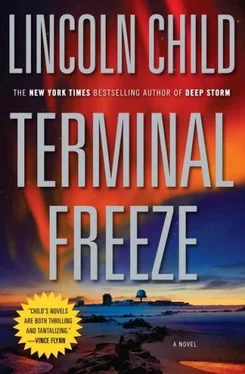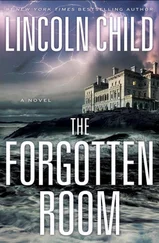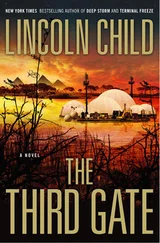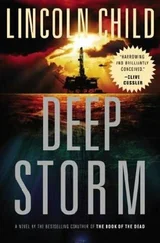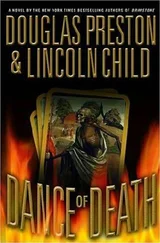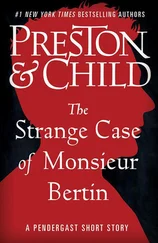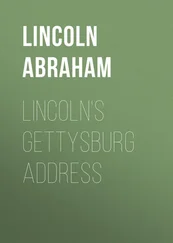Carradine brushed one hand against the other in satisfaction. “That’s better,” he said over the rumble of the diesel. “Okay. Bring ’em on.”
Gonzalez did one last head count. “Get inside,” he told the first row of people. “Find a comfortable spot to stow yourselves.”
“Don’t all bunch up together,” Carradine added. “Distribute the weight as evenly as possible.” He jumped down into the snow. “I’ve placed a spare battery-powered CB radio inside to communicate with the cab. Somebody will need to take charge of it.”
A tentative hand went up. “I will.” It was Fortnum.
Barbour watched as the two casualties were helped into the trailer: Toussaint, slumping, clearly under heavy sedation, babbling quietly to himself, and Brianna, her head bandaged, silent and looking terrified. As the line slowly shuffled closer, Barbour could feel the heat radiating out the open door. No doubt Carradine had it cranked all the way up, warming the trailer while he still could. “I’ll need somebody up front,” he said. “To feed me directional updates if things get hairy.”
“I’ll do it,” Barbour said.
Carradine looked at her. “Can you program a GPS unit?”
“I’m a computer scientist.”
“Good enough for me. Let me check the belly tarp and the alcohol evaporator, and we’ll be on our way.”
She stepped out of the line and into the relative shelter beneath the cab. As the last of the group climbed into the trailer, Marcelin handed up the cases of water and the emergency supplies. Carradine made a final inspection of the rig. Then he climbed onto the trailer and, after briefly surveying the interior and showing Fortnum the CB, he closed the door. Walking around to the rear, he disconnected the power conduit. Instantly, the trailer went dark save for the running lights at the rear.
“Ready?” Gonzalez asked.
The trucker gave him a thumbs-up.
“Then good luck and Godspeed.”
Carradine helped Barbour up into the cab, then trotted around the front and clambered into the driver’s seat. He did a quick equipment and instrument check against a clipboard list that hung on the wall behind him, buckled his seat belt, then plucked the CB hand-set from the dash. “You with me back there?” he spoke into it.
“We’re here,” came the reply.
“Ten four.” He replaced the radio, glanced over at Barbour. “Ready?”
She nodded.
“Then let’s go.” He released the air brake, shifted into gear, eased off the clutch. The truck shuddered, then began rolling slowly forward.
Barbour looked out the window, into the scudding snow. As they headed into the wastes and the dark, her last view of Fear Base was of the three soldiers-Gonzalez, Marcelin, and Phillips-standing by the empty sled, weapons ready, watching them depart.
For the last hour, the officers’ mess had been a scene of frantic activity. One by one, groups had been assembled, their readiness checked, and the soldiers had escorted them to the staging area. At one point Gonzalez had radioed, making a final appeal for Conti to see reason, to leave with the rest. Conti, watching rough takes on the digital video camera Fortnum left behind, barely listened. At last, Gonzalez muttered something about Conti not being worth the time it would take to force him into the truck and warned him to stay put. “You want to film something? Film the mess once we’ve killed it.” Marcelin and Phillips returned to escort the final group of six to the staging area.
That left the three of them alone.
Kari Ekberg glanced at the other two occupants of the mess. Conti, having finished watching the rough takes, was now feverishly scrawling notes on the clipboard he never seemed to be without. Wolff had secured two heavy-caliber sidearms from the military store and was toying with them. The way he jammed rounds into the extra clips with his thumb, as if filling an oversize Pez dispenser, made it seem as though he could be relied on to handle them properly.
This hardly made Ekberg feel better. She had been growing less and less confident of her decision to remain. Loyalty to a project was one thing; ambition was one thing; but being marooned here with some killing machine seemed increasingly like a questionable career move.
She tried to shake her reservations away. After all, hadn’t two of the scientists elected to remain behind with their data and their samples? Logan had chosen to stay with them. And Marshall – Marshall was out in the storm somewhere. He’d be returning, too. Be sides, there was the military contingent to think about-combat-trained and sporting a very impressive arsenal of weaponry, ready to hunt the creature down once the truck had departed. She told herself that her chances were better here, warm and dry, than in an eighteen-wheeler out on the ice.
Conti put down his pen, scanned the notes he’d just taken, then glanced up at the clock. “The truck will have left by now,” he said. “It’s time.”
Wolff put down the guns. “Time for what?”
“To film the hunt, of course. It’ll start any moment. I can’t take the risk of losing them.”
Wolff frowned. “Emilio, you can’t be serious.”
Conti picked up the video camera, examined its settings. “I would have liked to shoot the truck leaving, but I couldn’t take the chance-Gonzalez might have forced me to board it. But we can always stage that later.” He put down the camera. “The hunt, however, can’t be staged. It’s the moment we’ve been waiting for, what everything has been leading up to.”
“But that’s crazy.” The words were out almost before Ekberg had spoken them.
The director turned toward her. “What do you mean? I’ll stay well back from the soldiers. I’ll shadow them, follow them by ear-they’ll never know I’m there until the action starts and it’s too late to do anything about it.”
“But you won’t be safe-” Ekberg began.
“Do you think I’m safer here? Personally, I’d rather be close to the machine guns.”
“But Kari’s right,” said Wolff. “The soldiers are intentionally walking into danger. That means you’ll be exposed, as well.”
“Then come along.” Conti nodded toward the guns. “Bring those. We’re better off sticking together.”
Wolff didn’t reply.
“Listen to me,” Conti said. “We came up here to film that beast. Don’t you see the opportunity we’ve been given? This is a new story, and a far greater one than we ever expected. Do you really believe I’ll stay in this room, sitting on my hands, while the shot of a lifetime-maybe the shot of all time-is taking place a stone’s throw away?”
When nobody replied, he stood up and began to pace the room. “Of course there’s a degree of danger. That’s just what will make this the most exciting documentary ever. We’re living the actual events as they unfold; the raw materials are all around us. We three-the director, the field producer, the channel rep-we are the documentary. It’s experiential in the way no film has ever been before. Don’t you understand? We’re witnessing the dawn of an entirely new genre of film.”
As he spoke, Conti’s face flushed and his eyes glittered. His voice trembled with an almost messianic conviction. Despite her fear, Ekberg began to feel stirrings of excitement. Wolff listened in silence, his eyes following the director as he paced back and forth.
“And there’s something else,” Conti said. “Ashleigh is dead. She gave her life for this project. We should do it for her. I will be the narrator now.”
There was a moment of silence. Then Wolff spoke. “Do you really think you could pull it off?”
“I trained as a cinematographer, didn’t I? I’ll get shots that will make Fortnum retire his camera in shame.” Conti turned to Ekberg. “I’ll do the filming, but it will be a smoother sequence if you handle the sound equipment.”
Читать дальше
